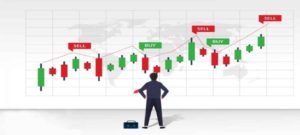ஒரு வர்த்தகர் பரந்த அளவிலான ஈர்க்கக்கூடிய குணங்களைக் கொண்டிருக்கலாம். ஒரு தொழில்நுட்ப ஆய்வாளர் சுயக்கட்டுப்பாடு இல்லாமல், அதிக ரிஸ்க் எடுத்தால், அவர்கள் பணத்தை இழக்க நேரிடும். வர்த்தகம் என்று வரும்போது, சுய ஒழுக்கத்தை எப்படி வளர்த்துக் கொள்ள முடியும்?
கீழே குறிப்பிடப்பட்டுள்ள படிகள் நேரடியானவை, கோட்பாட்டில், அவை. இந்த வழிகாட்டுதல்களை நீங்கள் கடைப்பிடித்தால், உங்கள் வர்த்தக அணுகுமுறையை மாற்றவும், உங்கள் ஒழுக்கத்தை மேம்படுத்தவும் முடியும். மிகவும் எச்சரிக்கையுடன் வர்த்தகம் செய்ய, உங்களுக்கு இந்த கூறுகள் தேவைப்படும்.
உங்கள் கவனத்தை மறுவரையறை செய்யுங்கள்
இலக்கை நோக்கி எப்போதும் உங்கள் பார்வை இருந்தால் சம்பாதிப்பதில் அதிக கவனம் செலுத்தலாம். பிரபலமான நம்பிக்கைக்கு மாறாக, மகிழ்ச்சியான முடிவுகளில் கவனம் செலுத்துவது ஒருபோதும் நன்மை பயக்கும் அல்லது ஆக்கப்பூர்வமானது அல்ல. ஏன்?
வர்த்தகர்கள் முடிவுகளில் கவனம் செலுத்தும்போது அவர்களின் உணர்ச்சிகளை நிர்வகிக்க முடியாது.
முடிவுகளுக்கு முன்னுரிமை அளிக்கும் வர்த்தகர்கள் பெரும்பாலும் இறுதிக் கோட்டைப் பெற மற்ற செயல்முறைகளைத் தவிர்க்கின்றனர். அதனால் அவர்கள் தங்கள் நஷ்டத்தை ஈடுகட்ட முதலீடுகளை மும்மடங்கு செய்கிறார்கள். அவர்கள் பகுப்பாய்வு பற்றி கவலைப்படுவதில்லை, வெற்றி மட்டுமே. இந்த நுட்பம் தெரிந்திருந்தால், நீங்கள் எப்படி வழக்கமாக வர்த்தகம் செய்கிறீர்கள் என்பதைக் கவனியுங்கள். சரிபார்ப்புப் பட்டியலைத் தயாரித்து, முன்கூட்டியே திட்டமிடுகிறீர்களா? நீங்கள் நிச்சயமாக உணர்வுகளுக்கு இடமளிக்கிறீர்கள்.
உண்மையிலேயே மிகவும் இன்றியமையாததைப் பாராட்ட, உங்கள் கவனத்தை பணம் சம்பாதிப்பதில் இருந்து கற்றல் மற்றும் சோதனை உத்திக்கு மாற்றவும். விரைவான முடிவுகளில் கவனம் செலுத்துவதற்குப் பதிலாக, உங்கள் அணுகுமுறையை மேம்படுத்துவதிலும் மேலும் பயிற்சி செய்வதிலும் கவனம் செலுத்துங்கள்.
இடர் மேலாண்மை நடைமுறையைப் பற்றி அறிந்து கொள்ளுங்கள்
ஒவ்வொரு முறையும் நீங்கள் வர்த்தகம் செய்யும் போது, பண மேலாண்மை என்பது வர்த்தகத்திற்கு முன், போது மற்றும் பின் நீங்கள் எடுக்கும் படிகளின் தொகுப்பாகும். ஒரு வர்த்தகரின் சமநிலையை ஒழுங்காக வைத்திருக்கவும், அவர்களின் ஆபத்து மற்றும் சாத்தியமான இழப்பைக் கட்டுக்குள் வைத்திருக்கவும் இந்த நடவடிக்கைகள் தேவைப்படுகின்றன.
ஆபத்தை மதிப்பிடுவது முக்கியம் என்பது வெளிப்படையாகத் தெரிந்தாலும், பல வர்த்தகர்கள் அதைப் பற்றி கவலைப்படுவதில்லை அல்லது அவர்கள் வசதியாக இருப்பதை மட்டுமே செய்கிறார்கள்.
முதலீட்டுத் தொகையைக் குறைப்பது அல்லது லாபம் எடுக்கும் அளவை அமைப்பது போன்ற சில பண மேலாண்மை யோசனைகள் ஒன்றுக்கொன்று முரணாக இருப்பது போல் தெரிகிறது. பணம் சம்பாதிக்க, ஒரு வர்த்தகம் தனது சொந்த லாபத்தை குறைக்க வேண்டும். எல்லாவற்றையும் இழப்பதே மிக மோசமான விஷயம் என்பதால், வர்த்தகரைப் பாதுகாப்பதே குறிக்கோள்.
இடர் மேலாண்மையை பழக்கமாக்குவது வர்த்தகர்கள் மன அழுத்தத்தில் வர்த்தகம் செய்யும்போது அவர்களின் உணர்ச்சிகளைக் கட்டுக்குள் வைத்திருக்க உதவுகிறது. பண மேலாண்மை என்பது சந்தை ஆராய்ச்சி, வர்த்தகப் பத்திரிக்கையை வைத்திருப்பது, லாபம் ஈட்டுதல் மற்றும் இழப்பை நிறுத்துதல் போன்ற கருவிகளைப் பயன்படுத்துதல் மற்றும் பலவற்றை உள்ளடக்கியது. அபாயகரமானவற்றை விட பாதுகாப்பான வர்த்தக உத்திகளைத் தேர்ந்தெடுப்பது மற்றும் பலவற்றையும் இது குறிக்கிறது.
உங்கள் இழப்புகள் மற்றும் தோல்விகளில் இருந்து கற்றுக்கொள்ளுங்கள்
ஒழுக்கம் என்பது ஒப்பந்தத்துடன் முடிந்துவிடக் கூடாது. உணர்ச்சிகளைக் கட்டுப்படுத்துவது, இழப்புகளை அர்த்தப்படுத்தும் போது அவற்றை மென்மையாக ஏற்றுக்கொள்வதைக் குறிக்கிறது. உங்கள் வர்த்தக உத்தியை மேம்படுத்த, நீங்கள் வர்த்தகங்களை பகுப்பாய்வு செய்து குறைபாடுகளை அடையாளம் காண வேண்டும்.
இழப்பில் கவனம் செலுத்துவதற்குப் பதிலாக, கற்றல் செயல்பாட்டில் கவனம் செலுத்துங்கள் (முதல் பத்தியைப் பார்க்கவும்). நஷ்டத்தை ஏற்றுக்கொள்வது நடைமுறையில் எளிமையாக இருக்கலாம், குறிப்பாக வர்த்தகர் தங்கள் கோட்பாட்டைச் சோதிக்க நடைமுறை சமநிலையைப் பயன்படுத்தினால்.
தீர்ப்பு
உணர்வுகள் மற்றும் ஒழுக்கமின்மை கவனிக்கப்பட வேண்டும். அதிக சிந்தனைக்கு மாற்றாக, ஒரு காகித நோட்புக்கை எடுத்து, உங்கள் வர்த்தகத் திட்டம் மற்றும் உத்தி, அத்துடன் உங்கள் இழப்புகள் மற்றும் சாத்தியமான தீர்வுகளை எழுதத் தொடங்குங்கள். அவற்றை உங்கள் முன்னால் வைத்திருப்பதன் மூலம் இதைச் செய்யலாம்.
முன்கூட்டியே திட்டமிட்டு உங்கள் சொந்த அனுபவத்தைக் கட்டுப்படுத்துவதன் மூலம் உங்கள் வர்த்தக அனுபவத்தைப் பொறுப்பேற்கவும். இந்த வழியில், நீங்கள் என்ன செய்கிறீர்கள் என்பதைப் பற்றி மேலும் அறிந்துகொள்ள முடியும். நம்புங்கள் அல்லது இல்லை, சுய ஒழுக்கம் எதிர்காலத்தில் வர்த்தகம் செய்யும் போது தொந்தரவு மற்றும் பிரச்சனையில் இருந்து உங்களைக் காப்பாற்றும்.




